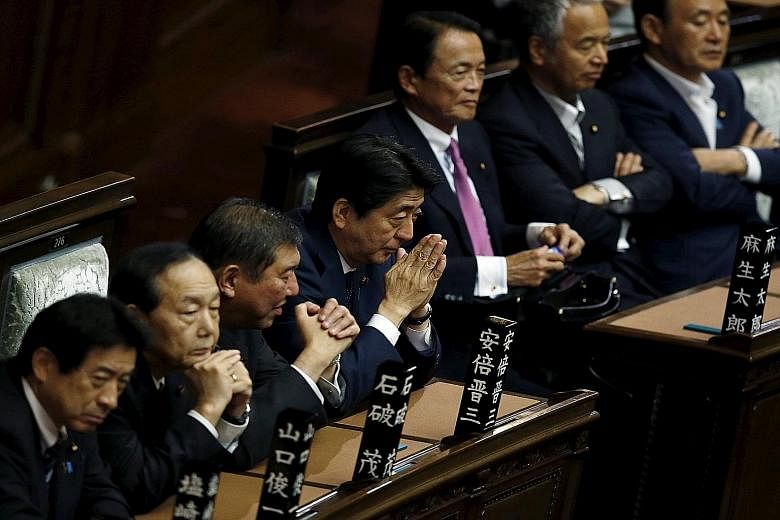Prime Minister Shinzo Abe has gained the powers he needs to send troops to fight abroad after Japan's Parliament passed landmark security Bills into law in the early hours yesterday.
But the opposition will not give up on the matter. The issue is likely to surface in elections next year and a long-drawn-out legal challenge is expected to hobble any attempts by the government to make use of the new laws' provisions.
Citing the public's rift over the pair of laws, opposition parties say what has become the nation's major post-war security policy shift must be made a top issue in an Upper House election slated for next summer in the hope of "punishing" Mr Abe's Liberal Democratic Party (LDP) and its coalition partner, the Komeito party.
To block the government from using the laws on the legal front, lawyers and constitutional scholars are planning to file lawsuits against the government over the legislation, arguing that it violates the war-renouncing Constitution.
"We oppose application and management of the laws. We are determined to take measures towards their abolishment and revision," Mr Susumu Murakoshi, president of the 36,000-strong Japan Federation of Bar Associations, said in a statement issued yesterday.
Mr Abe says the legislation does not alter Japan's commitment to an exclusively defence-oriented security policy in line with the Constitution, and that it is also fully legal in terms of international law.
"The legislation is necessary to safeguard the people's lives and peaceful way of living, and is aimed at preventing wars beforehand," he told reporters after the Upper House cleared the Bills with the backing of the ruling coalition and three minor opposition parties.
Asked about a majority of voters opposing the laws in opinion polls, he said he "would like to make increased efforts to explain the laws courteously and tenaciously" to win better public understanding.
Mr Katsuya Okada, leader of the main opposition Democratic Party of Japan (DPJ), criticised Mr Abe's push of the Bills through Parliament as sparking "a crisis for democracy". He vowed to beat the coalition in next summer's polls. The ruling bloc holds a majority in both houses of the Diet.
Mr Okada said the DPJ will consider submitting a Billto reinstate the previous governments' self-imposed ban on collective self-defence, or defending security ally the United States and other friendly nations under armed attack.
-
Military role abroad
-
Japan's Parliament has passed a controversial new law that reinterprets its pacifist Constitution to allow its military to fight overseas for the first time since World War II.
Q What does the new law mean for Japan?
A Japan's post-World War II Constitution bars it from using force to resolve international conflicts except in cases of self-defence. The use of force for self-defence was only permitted if the country was directly attacked.
But the government has reinterpreted the principle of self-defence to cover Japan's allies as well. The new law allows Japanese troops to defend their United States counterparts and troops of other nations friendly to Japan.
Q What is the size of Japan's military?
A Japan's Self-Defence Forces (SDF) consist of 227,000 personnel across the army, navy and air force, compared with the 2.33 million-strong armed forces in China and 1.43 million in the US, but more than Britain, France and Germany.
Q Under what conditions can Japan deploy the SDF overseas?
A
•When Japan is attacked or when a close ally is attacked and the result threatens Japan's survival and poses a clear danger to its people;
•When there is no other appropriate means available to repel the attack and ensure Japan's survival and protect its people;
•The use of force must be restricted to a minimum.
Q When will Japan be able to deploy the SDF overseas?
A The law will take six months to come into effect, but the government still has to seek parliamentary approval before sending troops on any dangerous overseas missions.
Q What kinds of missions could the SDF be used for?
A Japan could use the SDF in hostage situations, where the lives of its citizens or those of its allies were threatened.
•It would be possible for Japan to shoot down a missile fired by North Korea towards the US.
•Japan could take military action to keep shipping lanes secure, such as minesweeping in an active conflict zone.
REUTERS, AGENCE FRANCE-PRESSE
Dr Koichi Nakano, a professor of political science at Sophia University in Tokyo, says he expects opposition party members to step up moves with academics, lawyers, students and others to start a campaign to vote out ruling party lawmakers in the election. "If the ruling bloc were to lose a majority in the Upper House, it would make it difficult for the government to gain Diet approval for sending the Self-Defence Forces abroad," he said, referring to Japan's military.
Dr Nakano noted that the LDP has failed to win a majority alone in the Upper House since 1989.
The new laws effectuate a Cabinet decision in July last year to allow Japan to exercise the right to collective self-defence under strict conditions, such as Japan's survival coming under threat. They also expand logistics support for the militaries of the US and other countries, and for participation in international peacekeeping missions.

